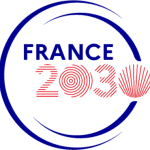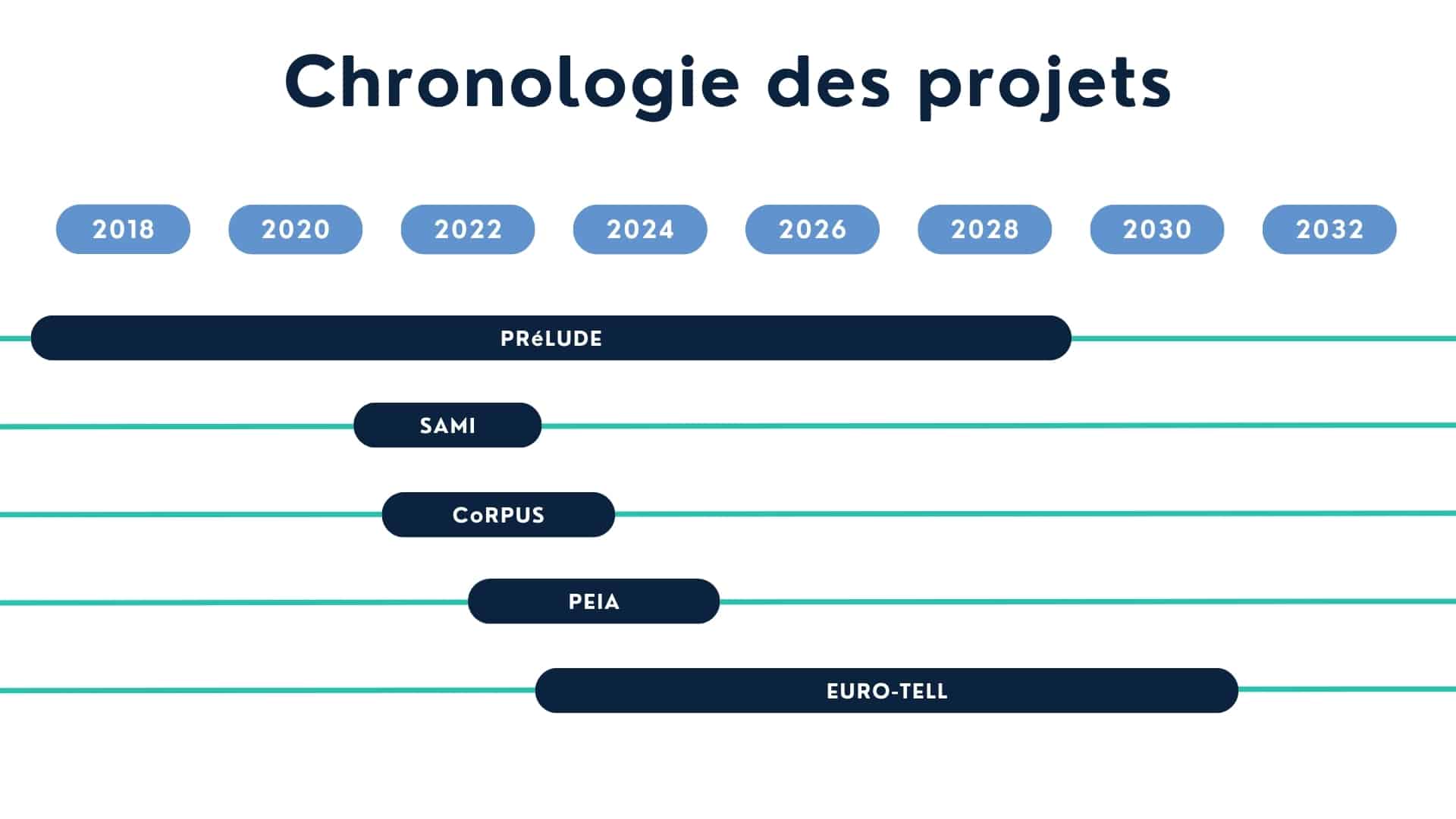Faculties and certain institutions of the Institut Catholique de Lille are committed to innovative pedagogy projects.
Co-carried by the Université Polytechnique des Hauts-de-France, these projects must support the creation of skills-based courses.

Parcours de Réussite en Licence Universitaire à Développement Expérientiel (PRéLUDE - Success Pathway in Bachelor’s Studies through Experiential Development)
A new way of addressing bachelor’s studies
Since 2018, the Institut Catholique de Lille and the Université Polytechnique des Hauts de France (UPHF) have been considering how to transform their pedagogical offerings and create successful courses integrating transdisciplinarity and a skills-based approach.
Within this framework and to support the implementation of this strategy, the Institut Catholique de Lille and the UPHF responded to the project called « Nouveau Cursus à l’Université » (New Courses at University) from the National Agency of Research (ANR). They were selected for their PRéLUDE (PIA3 NCU – ANR-18-NCUN-0019). The aim is to transform the courses offered at the Bachelor’s level in Knowledge and Skills Blocks.
The introduction of this skills-based approach articulated within the innovative ecosystems of the Institut Catholique de Lille, the socio-economic world, and its multidisciplinary environment is a foundation favorable for creating interdisciplinary courses responding to emerging needs and identifying new professions.
The PRéLUDE project is an innovative and experimental response supporting the deployment of the decree related to the national Bachelor’s Degree and implementing the Plan Etudiants (Students Plan) of Minister Frédérique Vidal by offering both a degree and a model of training in the first academic cycle, and by accompanying the student towards success in initial and continuous education (or lifelong education–FTLV).
Indeed, thanks to PRéLUDE, students are actors in their education trajectory in the Bachelor’s program based on the possibilities offered by the LMD system through modularization, rhythm management, and certifications.
This articulation is an innovative lever for the success of students and leads to various types of courses:
- A disciplinary Bachelor’s degree
- The multidisciplinary Bachelor’s degree in Personal Projects (L3P USCHOOL)
- A pre-oriented (towards emerging fields of activity) multidisciplinary Bachelor’s degree
The PRéLUDE project will last 10 years (2018-2028).
The PRéLUDE project benefits from State aid as managed by the Agence Nationale de la Recherche (National Agency for Research) under the Programme d’Investissements d’Avenir (Future Investments Program) launched by the State and implemented by the ANR with the reference ANR-18-NCUN-0019.
A Lever for Success and Innovation
PRéLUDE is an experimental model of education that is a powerful transformative lever for academic courses, promoting the transition to new societal needs at the territorial, national, and international levels. It is also a gradual lever for students’ success. It aims to create inventor profiles (“makers”) for our future world.
Strategic Development through Digital Dimension: I-Parcours
Since the 2018 Bachelor’s decree, Knowledge and Skills Blocks deployment has become widespread in higher education. With the PRéLUDE project, the Bachelor’s degrees of 4 faculties and several Université Catholique de Lille institutions will be positively affected before 2028.
The strategic development of the digital dimension and its uses is a strong axis of the PRéLUDE project. Thus, to further train students with digital tools, an intelligent platform to help them succeed will be set up based on their learning traces (Learning Analytics): this is called I-Parcours.
This platform will accompany and follow the students’ education through the Raisonneur Virtual d’Orientation (Virtual Orientation Reasoner). This is currently being designed by a team of computer scientists, researchers, and future users (students, teachers, pedagogical leaders, and advisers).
Hybridization with S.A.M.I
Winner of the project called Hybridation des formations de l’enseignement supérieur (Hybridization of Higher Education Courses) the project “Système d’Activités Médiatisées et Immersives” (SAMI – Mediatized and Immersive Activities System), carried by the UPHF, the Institut Catholique de Lille and INSA Hauts-de-France, offers a contribution to the innovative national initiatives on the creation of immersive and virtual contents.
It is based on a new articulation of the OMO type (Online Merge Offline) for education. Its goal is to strengthen the “in-person-remote” articulation by setting the lessons in the same educational context. The SAMI project, supported by an Observatory of Digital and Pedagogical Transformation, will offer new pedagogical activities and experiences, allowing ESR actors to innovatively engage in new hybrid courses.
A model in 3 dimensions
- The provision and creation of content (digital resources, MOOCs), by ensuring their digital accessibility (information dimension)
- The creation of a program of interactivity spheres allowing for the creation and support of hybrid teaching and learning activities: teachers-teachers, teachers-students, students-students spheres (interactive dimension)
- The creation of a collaborative environment for editing virtual and immersive content that can feed national programs as guided works and practical sessions (immersive dimension)
CORPUS: fostering the success of health studies
As part of the implementation of the health reform, the Institut Catholique de Lille, the Université Polytechnique Hauts-de-France, and the Université de Lille are keen to promote access to health studies MMOP to a diverse audience of students (PASS–Parcours Accès spécifique Santé/L.AS – Licence Accès Santé – Specialized Access Health Pathway/L.AS – Bachelor’s minor in Health Access) and to allow the personalization and success of their health studies trajectory.
CoRPUS offers the creation of a learning community through an open ecosystem involving all actors (students, tutors, teachers, teacher-researchers, administrative staff, and medical and paramedical professionals).
In this framework, CoRPUS focuses on creating Health Minors of level 2 for L.AS-2 students, offering them a “second chance,” mutualizing resources for the Health Minor (levels 1 and 2), and strengthening student accompaniment (personalization of the course, capitalization, tutored learning, and course remediation in Health or for the disciplinary course) by creating a learning community focusing on health studies.
Fostering the success of health studies through:
- The creation of level 2 Health Minors
- The mutualization of resources for the Health Minor (levels 1 & 2)
- The strengthening of student accompaniment: tutoring, creating a learning community
CorPUS is based on 4 principles:
- Collaboration between the different actors of the community
- Commitment, which recognition is done through the valorization and capitalization of skills
- Success by promoting personalization, integration, and sharing of good practices
- Improvement of tutoring through the exchange of good practices and the networking of tutoring strategies
PEIA: Plateforme d’Expériences Immersives Apprenantes (Learning and Immersive Experience Platform)
The pedagogical continuity plan has generated an acceleration of digital uses and has shown a commitment deficit among the learners. New learning challenges are emerging and encourage the transformation of pedagogical practices to a more inclusive digital pedagogy, through multi-user virtual and realistic environments.
The PEIA project (Plateforme d’Expériences Immersive Apprenantes -Immersive Learning Experience Platform), carried out by the UPHF, the Institut Catholique de Lille, and EdTech (French Start-ups in the educational sector), offers a community of learners experiences and knowledge in persistent worlds.
A real leap forward in pedagogical creation, PEIA is a platform for the use of inclusive pedagogy in persistent worlds (virtual universes) to “gamify” learning activities. It includes 5 dimensions:
- An environment of editorial tools with immersive gamified pedagogical content: la Fabrique (the Factory)
- A portal and a catalog referencing content production and certified proofs of immersive concepts: l’Entrepôt (the Warehouse)
- Persistent worlds, new places of experiences, and immersive pedagogical activities: Play Room and Learning Room
- An Immersive Learning Management System (I-LMS) supporting the activities of the Fabrique, the Entrepôt, and the persistent worlds
- An innovation accelerator in immersive pedagogy with the creation of a multi-site R&D team: MEET (IMmErsive lLearning Team), allowing the study and the technological transfer of the uses of immersive pedagogy
The project, as a demonstrator, aims to participate in the transformation of the professional practices of the educational community, to promote the use of immersive teaching environments, and to offer solutions to support the commitment of learners in new inclusive and participatory learning experiences.
Euro-Tell
EURO-TELL New EUROpean Experiential and Transition-based Learning ModEL Project: Acting at the heart of transitions, at the service of a more sustainable society, with ethics and responsibility, agility, and efficiency (PIA 4 ExcellencES).
The Université Polytechnique Hauts-de-France (UPHF and INSA Hdf) and certain institutions of the Université Catholique de Lille (ICL, IESEG, JUNIA), with the support of the European University EUNICE were selected for their EURO-TELL project based on transition objects. The project will be deployed over 8 years (2023-2031).
EURO-TELL: a coherent and interconnected model in the form of an innovative ecosystem.
Agile and open to the territory and Europe, EURO-TELL aims to create an ecosystem based on the consortium’s strengths and a triptych of research, education (Master’s and PhD), and innovation.
It is composed of three thematic transition hubs:
Silver Society and Disability
City, territory, and mobility, humanly intelligent
Future industry for a positive impact on the environment and human
To these three hubs are attached three European Graduate Schools and a Think-to-Do-Lab inspired by the Think Tanks model. This ecosystem will involve the different actors of the territory (companies, local and territorial communities, associations. . .).
The Graduate Schools have developed three master’s degrees: a European master’s in Research, a Personal and Professional Project master’s, and a master’s in Awareness and Certification. They also offer two types of Ph.D.s: a European PhD and a European Professional PhD.
The triptych Research—Education—Innovation, declined on the strategic themes of the hubs, will allow for the resolution of complex issues related to transition objects. Co-developed by the interested parties, it will be subject to the research and innovation projects of students, of complementary object-oriented lessons. It will be the basis of interdisciplinary research initiatives.
The Euro-Tell project benefits from State aid as managed by the Agence Nationale de la Recherche (National Agency for Research) under the Programme d’Investissements d’Avenir (Future Investments Program) launched by the State and implemented by the ANR with the reference ANR22-EXES-0006.



